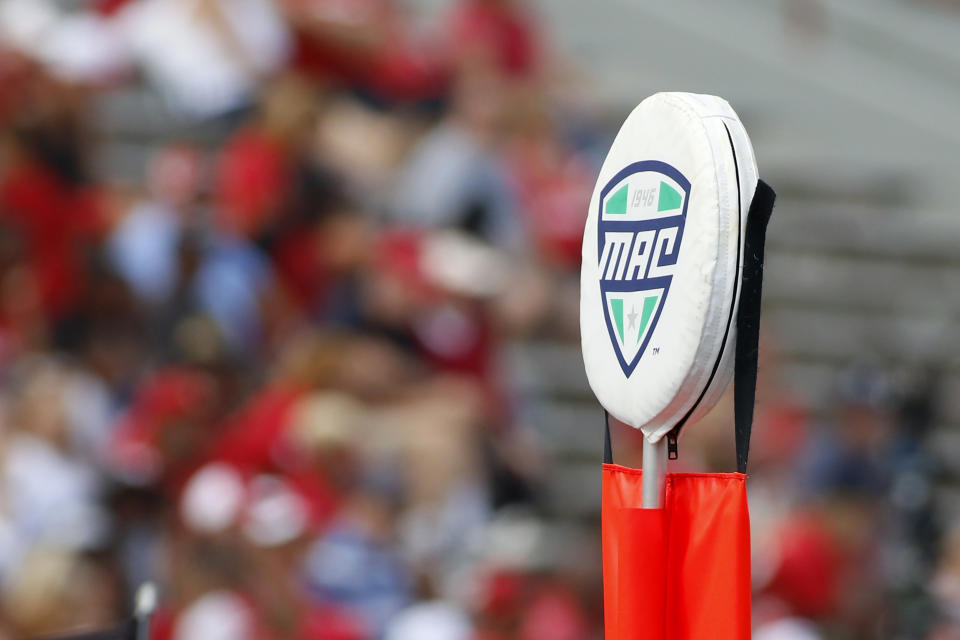The MAC canceled football. Its players? 'We all wanted to play'
Dustin Crum was at practice. Quian Williams was asleep. At 10:11 a.m. Saturday, when the world found out they wouldn’t be playing football this fall, two Mid-American Conference players, like so many others, were oblivious.
Then news started to filter through. Crum, a senior quarterback at Kent State, heard chatter during a walkthrough. Head coach Sean Lewis stepped away to check his phone.
Williams, a junior receiver at Eastern Michigan, awoke to a call. It was his dad. He picked up. Dad’s words stirred emotion.
The MAC, Williams learned, had decided to cancel fall sports. It became the first FBS conference to postpone football season. “I just couldn't believe that they got to the decision that we wasn't gonna play at all,” Williams told Yahoo Sports on Saturday night. “I kind of expected them to go to a conference-only schedule.” But MAC officials, citing coronavirus concerns, had decided there’d be no football in 2020.
And Williams was upset. He acknowledges, and understands, the reasoning: “Safety first.” But he and his EMU teammates had worked, for months, to sharpen themselves. To improve. To prepare for September.
“We all wanted to play,” he said.
In Northeast Ohio, Crum said Kent State players felt similarly. They gathered after their workout. Lewis confirmed their fears.
“It was kind of surreal,” Crum said.
When Crum, the league’s top QB, spoke with Yahoo Sports hours after the announcement, he was still searching. For answers, for stability, for words to describe an unprecedented day. And throughout the Midwest, hundreds of young athletes – football players, soccer players, field hockey players, volleyball players, runners – were right there with him.

What happens next for players?
Some players heard via social media. “I wish this news could be held for coaches to inform players rather than finding out through a tweet,” Ohio linebacker Jared Dorsa wrote. Others heard from teammates, or siblings, or friends.
Some had already opted out of the season. Others worried about scant testing programs and safety protocols. Many, though, were unperturbed by COVID-19. “Most of the guys on our team,” Crum says, “were pretty much all in, and ready to play for the season.”
“The way I look at it, it's obviously a risk,” Crum continued. “But I invested so much of my life [in football], and have been playing for such a long time, just to throw it away for a minute risk – and obviously playing football, you're putting your body at risk every game anyways. So that's just kind of how I viewed it. I mean, I understand both sides. You have to take care of people. And some people are at more risk than others. But like I said, I was ready to play.”
Now, players aren’t quite sure what to be ready for. They don’t know if they’ll keep practicing. Many hope to be able to play in the spring, and the conference does too. But what will that mean for seniors, like Crum, who hope to go pro? Who were banking on a standout final season, and perhaps the Senior Bowl, and the NFL combine, to elevate their stock?
“I don't know how it'll all work,” Crum admitted.
Buffalo running back Jaret Patterson, the MAC’s top NFL prospect, tweeted a statement that concluded: “Not sure what’s next for me but God will let me know and I’ll be ready.”
Patterson also retweeted multiple messages urging the NCAA to grant immediate eligibility to players who’ve had their seasons canceled who wish to transfer. A MAC assistant coach told Yahoo Sports’ Pete Thamel that schools from other conferences have already begun to attempt to poach top players. (This, of course, assumes other conferences will play their seasons – which, many would argue, is a poor assumption.)
There’s also the question of eligibility. If the season doesn’t happen, will 2020-21 count toward player limits? “Our coach said, basically, if he had to guess, the NCAA will treat it like they did with the spring,” Crum said. Meaning all athletes would retain their eligibility if seasons are completely wiped out. But Crum acknowledges: If only a few conferences cancel, and the rest play, that makes the NCAA’s decision more difficult.
‘I just wanna play football’
Crum and his teammates discussed some of these scenarios while grabbing lunch after their walkthrough. They retired to off-campus houses and apartments, and talked some more.
At Eastern Michigan, Williams did likewise, giving teammates “continuous love.” He also phoned friends back home. “Everybody's just keeping me and my teammates in their prayers,” he said.
At Toledo, as head coach Jason Candle left the team facility, he saw more than 20 players working out on the field.
By Saturday afternoon, some MAC players had pieced together a statement: “While we are disappointed by the loss of our fall competitive seasons, we applaud our leaders for prioritizing our health and safety. Moving forward we want to make sure this does not equate to the loss of eligibility for our athletes.
“As the spring approaches we call on commissioner Jon Steinbrecher to use the coming months to develop uniformed protocols and guidelines to avoid a similar scenario for our spring athletes.”
#MACUNITED #SpringintoMACtion pic.twitter.com/aEmYrZFs7P
— Our Lives Matter (@KavariAdams) August 8, 2020
Others were less political, more frank.
“I just wanna play football,” Akron safety Corey Thomas Jr. tweeted.
Williams, like many players nationwide, concurs.
So you’d want to play in the spring? I asked him to clarify.
“I'm just gonna be ready to play whenever they say,” he said.
More from Yahoo Sports:


